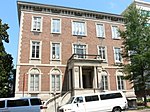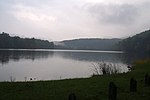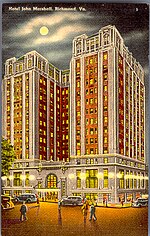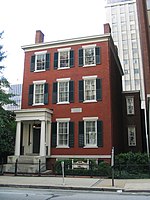Second Presbyterian Church (Richmond, Virginia)
19th-century Presbyterian church buildings in the United StatesChurches completed in 1848Churches in Richmond, VirginiaChurches on the National Register of Historic Places in VirginiaGothic Revival church buildings in Virginia ... and 4 more
National Register of Historic Places in Richmond, VirginiaPresbyterian churches in VirginiaRichmond, Virginia Registered Historic Place stubsVirginia church stubs

Second Presbyterian Church is a historic Presbyterian church located at 5 N. 5th Street in Richmond, Virginia. It was designed by architect Minard Lafever and was built in 1848. It is a brick veneer Gothic Revival style church with lancet windows and a square pinnacled tower with an arched entrance at the front of the church.It was listed on the National Register of Historic Places in 1972.
Excerpt from the Wikipedia article Second Presbyterian Church (Richmond, Virginia) (License: CC BY-SA 3.0, Authors, Images).Second Presbyterian Church (Richmond, Virginia)
East Main Street, Richmond Monroe Ward
Geographical coordinates (GPS) Address Nearby Places Show on map
Geographical coordinates (GPS)
| Latitude | Longitude |
|---|---|
| N 37.540277777778 ° | E -77.439722222222 ° |
Address
Main & 5th
East Main Street
23298 Richmond, Monroe Ward
Virginia, United States
Open on Google Maps











